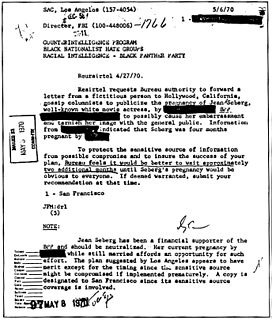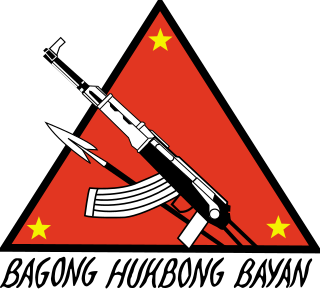
COINTELPRO (1956–1971) was a series of covert and illegal projects conducted by the United States Federal Bureau of Investigation (FBI) aimed at surveilling, infiltrating, discrediting, and disrupting domestic American political organizations. FBI records show COINTELPRO resources targeted groups and individuals the FBI deemed subversive, including feminist organizations, the Communist Party USA, anti–Vietnam War organizers, activists of the civil rights movement and Black Power movement, environmentalist and animal rights organizations, the American Indian Movement (AIM), independence movements, a variety of organizations that were part of the broader New Left, and right-wing groups such as the Ku Klux Klan and the National States' Rights Party.

The Adbusters Media Foundation is a Canadian-based not-for-profit, pro-environment organization founded in 1989 by Kalle Lasn and Bill Schmalz in Vancouver, British Columbia. Adbusters describes itself as "a global network of artists, activists, writers, pranksters, students, educators and entrepreneurs who want to advance the new social activist movement of the information age."

Medea Benjamin is an American political activist who was the co-founder of Code Pink with Jodie Evans and others. Along with activist and author Kevin Danaher, she created the fair trade advocacy group Global Exchange. Benjamin was the Green Party candidate in California in 2000 for the United States Senate, receiving the highest raw vote total of any Green Party U.S. Senate candidate. She has contributed to OpEdNews and The Huffington Post.

The World Peace Council (WPC) is an international communist organization that advocates universal disarmament, sovereignty and independence and peaceful co-existence, and campaigns against imperialism, weapons of mass destruction and all forms of discrimination. It was founded in 1950, emerging from the policy of the Communist Party of the Soviet Union to promote peace campaigns around the world in order to oppose "warmongering" by the United States. Throughout the Cold War, it was largely funded and controlled by the Soviet Union, and refrained from criticizing or even defended the Soviet Union's involvement in numerous conflicts. These factors led to the decline of its influence over the peace movement in non-Communist countries. Its first president was the French physicist and activist Frédéric Joliot-Curie. It was based in Helsinki, Finland from 1968 to 1999, and since in Athens, Greece.

The New People's Army, abbreviated NPA or BHB, is the armed wing of the Communist Party of the Philippines (CPP), based primarily in the Philippine countryside. It acts as the CPP's principal organization, aiming to consolidate political power from what it sees as the present "bourgeois reactionary puppet government" and to aid in the "people's democratic revolution". Founded on March 29, 1969, by the collaboration of Jose Maria Sison and former members of the Hukbalahap led by Bernabe Buscayno, the NPA has since waged a guerrilla war based on the Maoist strategy of protracted people's war. The NPA is one of the key figures in the ongoing Communist rebellion in the Philippines, the longest ongoing conflict in the country.
The New Communist Movement (NCM) was a diverse left-wing political movement principally within the United States, during the 1970s and 1980s. The NCM were a movement of the New Left that represented a diverse grouping of Marxist–Leninists and Maoists inspired by Cuban, Chinese, and Vietnamese revolutions. This movement emphasized opposition to racism and sexism, solidarity with oppressed peoples of the third-world, and the establishment of socialism by popular revolution. The movement, according to historian and NCM activist Max Elbaum, had an estimated 10,000 cadre members at its peak influence.

The Communist Party of the Philippines is a far-left, Marxist-Leninist-Maoist revolutionary organization and communist party in the Philippines, formed by Jose Maria Sison on 26 December 1968. It is designated as a terrorist group by the United States Department of State through Executive Order No. 13224 together with Sison and the New People's Army (NPA) in 2002. The European Union, through Council Decision (CSFP) 2019/1341, renewed the terrorist designation of the CPP-NPA in 2019, though the European Union's second highest court ruled in September 2009 to delist Sison as a "person supporting terrorism" and reversed a decision by member governments to freeze assets. According to the US' Central Intelligence Agency (CIA) World Factbook, the CPP and its armed wing, the NPA, aims to destabilize the Philippines' economy and overthrow the national government.

Opposition to United States involvement in the Vietnam War began with demonstrations in 1964 against the escalating role of the United States in the Vietnam War and grew into a broad social movement over the ensuing several years. This movement informed and helped shape the vigorous and polarizing debate, primarily in the United States, during the second half of the 1960s and early 1970s on how to end the war.
The Mouvement contre le racisme et pour l'amitié entre les peuples is an anti-racist French NGO, founded in 1949. Mouloud Aounit was its first general secretary (1989–2004), then president (2004–2008), then member of the presidential college (2008–2011) not to belong to the French Communist Party (PCF).
Dr. Randall Caroline Forsberg led a lifetime of research and advocacy on ways to reduce the risk of war, minimize the burden of military spending, and promote democratic institutions. Her career started at the Stockholm International Peace Research Institute in 1968. In 1974 she moved to Cambridge, Massachusetts to found the Institute for Defense and Disarmament Studies (IDDS) as well as to launch the national Nuclear Weapons Freeze Campaign. Randall Forsberg was accompanied by an important colleague by the name of Hellen Caldicott while she was leading the Nuclear freeze movement in both Manhattan and Central Park. Both women were met with many challenges in their efforts to lead the Nuclear Freeze Movement. These challenges included gender discrimination and discreditation as influential leaders by the media. Forsberg's strong leadership in the nuclear freeze movement is thought to be very influential in the writing of foreign policy during the Reagan administration and is even credited with catalyzing the negotiation of the INF treaty between President Reagan and Mikhail Gorbachev.

The anti-nuclear movement in the United States consists of more than 80 anti-nuclear groups that oppose nuclear power, nuclear weapons, and/or uranium mining. These have included the Abalone Alliance, Clamshell Alliance, Committee for Nuclear Responsibility, Nevada Desert Experience, Nuclear Information and Resource Service, Physicians for Social Responsibility, Plowshares Movement, Women Strike for Peace, and Women's International League for Peace and Freedom. The anti-nuclear movement has delayed construction or halted commitments to build some new nuclear plants, and has pressured the Nuclear Regulatory Commission to enforce and strengthen the safety regulations for nuclear power plants.

A peace movement is a social movement which seeks to achieve ideals, such as the ending of a particular war or minimizing inter-human violence in a particular place or situation. They are often linked to the goal of achieving world peace. Some of the methods used to achieve these goals include advocacy of pacifism, nonviolent resistance, diplomacy, boycotts, peace camps, ethical consumerism, supporting anti-war political candidates, supporting legislation to remove profits from government contracts to the military–industrial complex, banning guns, creating tools for open government and transparency, direct democracy, supporting whistleblowers who expose war crimes or conspiracies to create wars, demonstrations, and political lobbying. The political cooperative is an example of an organization which seeks to merge all peace-movement and green organizations; they may have diverse goals, but have the common ideal of peace and humane sustainability. A concern of some peace activists is the challenge of attaining peace when those against peace often use violence as their means of communication and empowerment.

The ongoing communist rebellion in the Philippines is a conflict between the government of the Philippines and the New People's Army (NPA), which is the armed wing of the Marxist–Leninist–Maoist Communist Party of the Philippines (CPP). The conflict is also associated with the National Democratic Front of the Philippines (NDFP), which serves as the political wing of the CPP.
Licensed to Kill? The Nuclear Regulatory Commission and the Shoreham Power Plant, a 1998 book by Joan Aron, presents the first detailed case study of how an activist public and elected officials of New York state opposed the Shoreham Nuclear Power Plant on Long Island. The book explains that nuclear power faltered when "public concerns about health, safety, and the environment superseded other interests about national security or energy supplies".

An anti-war movement is a social movement, usually in opposition to a particular nation's decision to start or carry on an armed conflict, unconditional of a maybe-existing just cause. The term anti-war can also refer to pacifism, which is the opposition to all use of military force during conflicts, or to anti-war books, paintings, and other works of art. Many activists distinguish between anti-war movements and peace movements. Anti-war activists work through protest and other grassroots means to attempt to pressure a government to put an end to a particular war or conflict or to prevent it in advance.

The Workers World Party (WWP) is a revolutionary Marxist–Leninist political party in the United States founded in 1959 by a group led by Sam Marcy of the Socialist Workers Party (SWP). Marcy and his followers split from the SWP in 1958 over a series of long-standing differences, among them their support for Henry A. Wallace's Progressive Party in 1948, the positive view they held of the Chinese Revolution led by Mao Zedong and their defense of the 1956 Soviet intervention in Hungary, some of which the SWP opposed. The SWP supported the Chinese Revolution.

Joan Greenbaum is an American political economist, labor activist, and Professor Emerita at the CUNY Graduate Center and LaGuardia Community College. She also taught and conducted research at Aarhus University, and the University of Oslo (Informatics) (1995–96). Her numerous books and articles focus on participatory design of technology information systems, technology and workplace organization, and gender and technology.

The United Front Against Fascism (UFAF) was an anti-fascist conference organized by the Black Panther Party and held in Oakland, California, from July 18 to 21, 1969.
Black Alliance for Peace is a non-profit organization based in the United States that is focused on human rights from an anti-war, anti-imperialist perspective. The Latin American and Caribbean Community Center Inc. is the fiscal sponsor of the organization.













